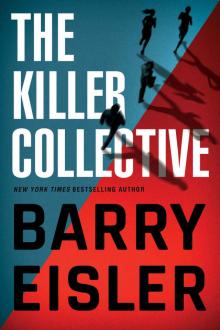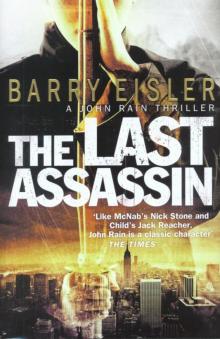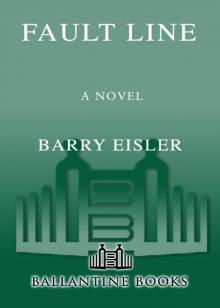- Home
- Barry Eisler
Inside Out: A novel Page 2
Inside Out: A novel Read online
Page 2
“Good, now you’re thinking. You need to destroy all contemporaneous records describing what’s on the tapes because that’s the next thing the court will ask for if the tapes are unavailable. You destroy all records of who had access to the tapes, of who might have knowledge of what was on them. And you create a paper trail of the proper authorizations that predates the court order. You claim the tapes had no further intelligence value, and … yes, yes, you say you had to destroy them because if they ever leaked, they could compromise the identities of field agents, patriotic men and women who are risking their lives every day on the front lines of the war on terror to keep America safe. Fox, and Broder and Klein and Krauthammer and Hiatt and Ignatius and the rest, they’ll pick up that angle and run interference for us, attack the patriotism of anyone who questions the decision to destroy the tapes. They’ll make it a political issue, it won’t be a legal one. ‘Only the angry left would want to put our soldiers and spies in danger,’ that kind of thing.”
None of them spoke.
Come on, Ulrich thought. Man up. We can do this.
“Look,” he said, “you’re not going to be alone, okay? We’ll get someone highly placed in the administration to leak the same talking points.”
Clements looked doubtful. “The vice president?”
“Definitely possible. But if not him, me or someone else who can speak for him. We’ll give the background not for attribution, the papers will publish it, and then the DCI, the vice president, whoever, they’ll go on all the Sunday morning talk shows and cite as evidence for our positions the articles the newspapers wrote based on what we fed them.”
Clements nodded, a glimmer of understanding in his eyes. “Information laundering.”
“Exactly,” Ulrich said, rather liking the phrase. “Just the way drug traffickers pass their money through corrupt banks to make the money usable in society, we need to pass our talking points through the mainstream media to make the talking points seem objective. You see? The mainstream media turns our talking points into news stories. They love the access we give them, it makes them feel savvy. And we love the coverage they give us in return. It’s a good system and it always works. It’ll work here, too.”
“It’s still going to be a scandal,” Clements said, apparently determined not to keep up.
“Of course it’s going to be a scandal,” Ulrich said, disgusted that his Hey, we’re all in this together pep talk apparently had accomplished nothing. “And you might even have to resign for it. Would you rather own up to not even knowing where the tapes are or how many there actually were or what the hell happened to them? How do you think the Fourth Circuit would respond if you said, ‘Sorry, we don’t know where the tapes are, we can’t find them’? You think they’d actually believe you could be that inept? You and I know better, but the court? They’d think it was a cover-up because no one could be so stupid as to misplace ninety-two tapes that, if they ever see the light of day, would be the most damaging national security leak in the history of the nation. You’d have so many outside investigations up your ass you’d spend the rest of your life trying to shit them out.”
Clements glared, but took the rebuke. “I still don’t see what this gets us.”
“Number one, it gets us time—time to conduct our own investigation, from the inside. If we do that, with a little luck we recover the tapes ourselves, do what should have been done in the first place, and the truth never gets out. The only way you’re going to cover this up is by ‘confessing’ to a lesser crime. How can you not see that? The media will jump all over the confession because for Christ’s sake, no one would confess to destroying those tapes if he hadn’t actually done it. No one will suspect the confession is actually concealing something worse, and for now the revelation of a few destroyed tapes will obscure the existence of just how many tapes there really were and what actually happened to them. Think the Forest Service, starting small, controlled fires to prevent the big ones, all right? How much more do I need to spell this out for you?”
“It’ll never work,” Clements said. “Someone will smell political opportunity. We’ll never avoid an investigation.”
“No? Haven’t you been briefing Congress on the program?”
“Just the gang of eight,” Clements said, using shorthand for the Democratic and Republican heads of the House and Senate, and the chair and ranking minority member of the House and Senate Intelligence Committees. “But we’ve been deliberately fuzzy on the details.”
“The details don’t matter,” Ulrich said. “What matters is that the briefings took place. You think the Speaker of the House wants to get into a public fight over what she was told and when she was told it? She loses that battle just by having to fight it.”
Were they getting it? He still wasn’t sure.
“Plus, I know how you guys work. What did Goss testify to Congress that time? ‘It may be only a matter of time before al Qaeda attacks the United States,’ wasn’t that it? May be, but maybe it won’t be? My God, how many positions can you take in the same sentence? Go back to your records, I’ll bet you can find something in a briefing about videotapes and whether they should be preserved. I guarantee someone dropped some casual mention just in case there was ever a problem later. Work this right and you can use the media to implicate anyone. And the gang of eight will know it.”
There was a pause while they absorbed the diagnosis. Dire, with a brutal treatment regimen, but not without hope.
“I’m not taking all the heat for this,” Clements said. “I’m not going down alone.”
Ulrich could almost have smiled. Clements was in. Now they were just negotiating price.
“Then find someone at CIA who will. Who’s in a position to have authorized the destruction of those tapes? Get to that person. Use whatever leverage you need to. And make sure he’s on board.”
“There’s no one else. That would be a decision for the director of the National Clandestine Service. Anything else will look like bullshit.”
“Then pin it on Killman’s predecessor. He’s got a nice cushy job in the private sector now, right? Intelligence contractor, making four times his government salary? You can’t provide him with the right incentives to play ball? You don’t have any dirt on him?”
Clements smiled, the smile of someone who’s been smelling blood in the water and only just realized it was coming from someone else. “I’ll see what can be done.”
“But remember,” Ulrich said, “all this is doing is buying us time. The most important thing is that we find those tapes, or verify their destruction.”
“How are we going to do that?”
Ulrich closed his eyes and suppressed the urge to shout. If he could work with just one competent organization. Just one.
“You need to put together a team,” he said. “Comprised of people with the right talents and the right incentives.”
“Meaning?”
“Meaning, how many field interrogators are featured in those videos?”
Clements shrugged. “Maybe a half dozen.”
“Military experience?”
“Of course. They’re all Spec Ops veterans, now with Ground Branch.”
“Good, then they have the talent. And they’ll understand that if those videos ever get out, the least they can expect will be public ostracism. More likely, prison. That means we can trust them.”
The three Agency men were nodding now. They were getting it. Slow as ever, but educable if you took the time and trouble to spell things out, if you showed them the one narrow route that offered a chance of saving them.
“Recall those men from the field. I don’t care what they’re working on, I don’t care what their priorities are, as of this moment they have a new assignment. You run the investigation, reporting directly to me. You manage the field, I manage the political cover. There are a lot of people, people from both parties, who have a reason to want those tapes secured. If we need their cooperation, I’ll make sure we have it.”
“Let me worry about that. For now, everything is need-to-know. And speaking of which, communication on this is face-to-face or by secure phone only. No writing, no paper trails.”
Ulrich glanced down at a small sign in the pathway next to him. Through the frost obscuring the face of it he read Silence and Respect.
He took off a glove, reached into his coat pocket, and clicked off the Dictaphone he’d been running since this otherwise off-the-record meeting began. Then he came out with a tube of ChapStick to conceal what he’d really been up to. He rubbed the ChapStick across his lips, dropped it back into his pocket, and pulled the glove back on. It wasn’t the first time he’d taped these sorts of conversations and he doubted it would be the last. He knew he would never need the recordings, but it would still feel good to have them. If his enemies ever breached all his other defenses and threatened to close in on him, he could brandish his recordings like a suicide bomb. A last-ditch threat in case the worst should ever happen. And the worst had never looked more likely than it did right now.
Still, on balance he was starting to feel a little better. He’d been rattled there for a moment, true, especially when they’d mentioned the Caspers, but that was before he’d had a chance to consider the options. Now, the more he thought about it, the more he realized he had assets he could deploy. Everybody was exposed on this, if not legally, then at least politically. The main thing was, he had a plan. And no one could work a plan the way he could.
“Remember,” he said. “The New York Times. Two interrogation tapes, as far as you know, destroyed years ago. Now go. Get it done.”
The New York Times, December 6, 2007
CIA DESTROYED TAPES OF INTERROGATIONS
WASHINGTON—The Central Intelligence Agency in 2005 destroyed at least two videotapes documenting the interrogation of two al Qaeda operatives in the agency’s custody, a step it took in the midst of congressional and legal scrutiny about the CIA’s secret detention program.
The videotapes showed agency operatives in 2002 subjecting terror suspects—including Abu Zubaydah, the first detainee in CIA custody—to severe interrogation techniques. They were destroyed in part because officers were concerned that tapes documenting controversial interrogation methods could expose agency officials to greater risk of legal jeopardy.
The CIA said today that the decision to destroy the tapes had been made “within the CIA itself,” and they were destroyed to protect the safety of undercover officers and because they no longer had intelligence value.
PART ONE
All told, more than three thousand suspected terrorists have been arrested in many countries. And many others have met a different fate. Let’s put it this way: they are no longer a problem to the United States and our friends and allies.
GEORGE W. BUSH
They literally were chaining people up for days …. If they ever had videos of this, it’s something out of the thirteenth century.
BOB WOODWARD
So it appears we now have evidence Ghul was in a CIA prison. Where he is today is still a mystery ….
JUSTICE DEPARTMENT OFFICE OF LEGAL COUNSEL MEMO
The New York Times, March 2, 2009
U.S. SAYS CIA DESTROYED 92 TAPES OF INTERROGATIONS
The government on Monday revealed for the first time the extent of the destruction of videotapes in 2005 by the Central Intelligence Agency, saying that agency officers destroyed 92 videotapes documenting the harsh interrogations of two Qaeda suspects in CIA detention including the simulated drowning technique called waterboarding.
1
About a Hundred Percent
Ben Treven could feel the Australians looking at him again, sizing him up for whether he’d make a good victim tonight. He brushed his blond hair out of his face and kept his gaze on nothing in particular, nodding his head slightly as though he was enjoying the pulsing house music. He knew the smart thing was to ignore them, but part of him couldn’t help hoping they’d take their wordless interview just a little further. It had been a hell of a day and he could feel that old, crazy urge to unload on someone. If these guys wanted to give him a reason, it was up to them.
The three of them were in civilian clothes, but he’d heard the accents and seen the swagger and took them for sailors on shore leave. Manila’s Burgos Street, an eternally crumbling matrix of neon and girly bars and massage parlors, had ingested them as it had ingested generations of sailors and marines and sex tourists before them. It would appropriate their money, alleviate their lust, and expel them afterward like pale effluent into the dank Manila night.
The burliest of the three missed his shot at the spotlit pool table, and as he stepped away to make room for his buddy, he squinted and waved a hand up and down in Ben’s line of sight, palm forward, as though wiping a window. The gesture read, Hello? Anybody there?
Ben kept his expression blank. Oh yeah, pal, somebody’s here. And believe me, you don’t want to meet him.
A petite Filipina waitress in heels and a microscopic skirt sauntered over to the pool table, balancing a tray of San Miguels one-handed. Ben hadn’t seen her earlier—she must have just started her shift. She took the Australians’ pesos, distributed their beers, and studiously failed to respond to their leering smiles. Then she turned and headed in Ben’s direction, the Australians’ eyes following her ass.
“You need another drink, sweetie?” she asked Ben, smiling, her eyes dark, her teeth white against the smooth brown skin of her face.
He was standing with his back to the bar and she would have known he could have just ordered from the bartender. He didn’t know whether her interest was personal or professional. He wondered whether it would irritate the Australians.
He shook his head and offered only a polite smile. “Thanks, I’m good.”
She leaned a little closer. “Are your eyes … green?”
“That’s what people tell me.”
She smiled again. “It’s my favorite color. If you need anything, just tell me, okay?”
“I will. Thanks.”
He told himself that as long as he didn’t do anything to provoke them, it wasn’t his fault. But he also recognized that he was ignoring them almost ostentatiously now, that a more effective way to avoid a problem would have been to raise his Bombay Sapphire and give them a cold smile: I’m aware of you, I’m not afraid of you, I’m being friendly so you can now look for trouble elsewhere without having to acknowledge you’ve backed down to the guy you were initially assessing.
He took a swallow of the gin and set the glass down on the bar. Yeah, that would have been the better way. But that afternoon his ex-wife had told him she never wanted to see him again, that their daughter, Ami, believed the man now raising her was her real father, that he shouldn’t have tracked them down in the first place, and what could he have been thinking after they hadn’t heard from him in nearly three years? She hadn’t even seemed angry when he’d approached her in the rain in front of Ami’s suburban Manila school, just uncomfortable, as though he was no more than an old acquaintance she would have preferred not to run into. She’d countered his protests, ignored his entreaties, and dismissed him with obvious relief. And instead of doing the minimally dignified thing and just leaving, he had lurked around the corner, getting wetter and angrier, until he heard the school bell, and then he had watched pathetically from behind a tree as his ex-wife collected their small daughter, kissing her and taking her by the hand and leading her away before Ben even had time to get a good look at her face. And now he was on his third double Bombay Sapphire, and these chumps were giving him the stink eye, and the bar was too noisy and the spotlights too glaring and Manila was too fucking polluted and humid and he was sick of it, he was sick of all of it, and someone was going to pay.
The burly Australian waved again. Ben maintained his thousand-yard stare. The Australian cocked his head and said something to his buddies; over the music a
nd the noise of conversation at the bar, Ben couldn’t hear what. The three of them started walking over. Ben noted they hadn’t put down their pool cues. His heart kicked a little harder and he felt his mouth wanting to twist into a smile.
The Australians took their time, watching him, continuing to gauge him as they approached. None of the bar’s patrons, generally young, mostly western, universally stupid, seemed to notice. Ben remained motionless. The Australians weren’t sure what he was, and Ben knew they would bark before they got up the courage to bite. Amateurs.
They stopped an arm’s distance in front of him, three abreast, the burly one in the middle, the pool cue in his left hand, his right arm draped across his buddy’s shoulder. He said, “Looking out of it there, mate. Too much to drink, eh?”
Ben kept his gaze unfocused, noting the placement of their hips and hands, smiling now as though at some private joke. The burly one was clearly the leader. Drop him suddenly and violently and the other two would be useless for anything other than hauling his carcass home. There were so many ways to do it, too, it was almost sad to have to choose. The guy’s weight was on his right foot, exposing the instep to a stomp. His knees were open, too, and so were his balls. Or start with the throat, move to the head, then work your way down in whatever time you had before the guy collapsed.
The guy leaned in, his eyes trained on Ben’s face. “You hear me, mate? I’m talking to you.”
Still Ben didn’t look at them. “I know. It’s making it harder for me to ignore you.”
The guy furrowed his brow. “You’re trying to ignore us, is that it?”
In a different mood, Ben might have felt sorry for the guy. He might have just met the guy’s eyes and let him know with a look what was a second away from happening. Then maybe give them a face-saving way out, maybe tell them he was just here to chill, sorry if he’d done anything to offend them, fair enough?

 All the Devils
All the Devils Requiem for an Assassin
Requiem for an Assassin The Killer Collective
The Killer Collective The Chaos Kind
The Chaos Kind The God's Eye View
The God's Eye View Paris is a Bitch
Paris is a Bitch The Khmer Kill: A Dox Short Story (Kindle Single)
The Khmer Kill: A Dox Short Story (Kindle Single) The Last Assassin
The Last Assassin The Detachment
The Detachment The Night Trade (A Livia Lone Novel Book 2)
The Night Trade (A Livia Lone Novel Book 2) Fault Line
Fault Line Hard Rain
Hard Rain The Khmer Kill_A Dox Short Story
The Khmer Kill_A Dox Short Story London Twist: A Delilah Novella
London Twist: A Delilah Novella The Lost Coast
The Lost Coast Rain Fall
Rain Fall Zero Sum
Zero Sum Killing Rain
Killing Rain John Rain 08: Graveyard of Memories
John Rain 08: Graveyard of Memories A Clean Kill in Tokyo (previously published as Rain Fall)
A Clean Kill in Tokyo (previously published as Rain Fall) Inside Out: A novel
Inside Out: A novel John Rain 07 - The Detachment
John Rain 07 - The Detachment Graveyard of Memories
Graveyard of Memories The Lost Coast -- A Larison Short Story
The Lost Coast -- A Larison Short Story Zero Sum (A John Rain Novel)
Zero Sum (A John Rain Novel)